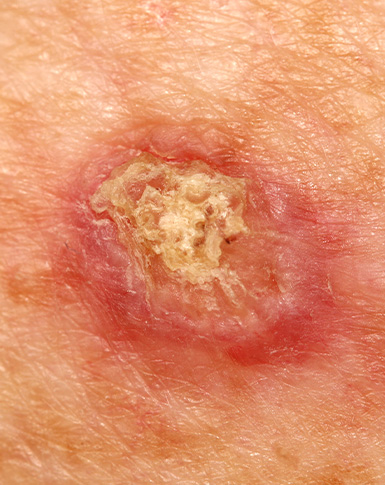
What Is Squamous Cell Carcinoma?
Skin cancer called squamous cell carcinoma (SCC) is the second most common type of skin cancer, affecting millions of people each year. Carcinoma of the skin occurs when the cells on the upper layers of your skin (known as the squamous cells) mutate or change. This skin cancer is due to excessive or chronic sun exposure to the sun’s damaging UV rays. SC can look wart-like in appearance or appear as a firm nodule on the sun exposed skin that may flake and bleed when traumatized. It is important to have an assessment if you notice suspicious growth. While squamous cell carcinoma is managed locally when treated early, over time, it has the potential to metastasize (spread to other areas of your body).
What Causes Squamous Cell Carcinoma?
Having fair skin, a light complexion, or blue/green eyes increases your risk of skin cancer, but everyone has a risk of developing squamous cell carcinoma. Men and women who expose their skin to the sun for work or hobbies may have an increased risk of acquiring this type of skin cancer. Research studies have shown that it is more common in men than women and usually affects adults over the age of 50, although younger individuals can also develop cutaneous squamous cell carcinoma. Individuals who have used indoor tanning beds are also susceptible to squamous cell cancers (and account for many of our new skin cancer patients each year). Other known risk factors for developing SCC are having radiation exposure in the past or from a suppressed immune system (due to medications or other medical conditions like leukemia), or a history of precancerous skin lesions.

Symptoms of Squamous Cell Carcinoma
As with any condition or cancer, paying attention to your skin and knowing what lesions and growths are present is important. If you notice a growth that begins to enlarge, crust over, itch, or bleed — this warrants a visit to the dermatologist. Squamous cell carcinoma will start to evolve on the surface of the skin and may even be mistaken for a wart or benign skin growth. Sometimes, they are soft and tender, or they can present as scaly, rough, thick, or firm spots that simply will not heal or are prone to bleeding. When any lesion on your skin starts to change in symmetry, color, shape, or size — it is always wise to visit a board-certified dermatologist. If left untreated, you risk more than just the appearance of your skin, as SCC can become life-threatening.
CONTACT US
Have questions or want to schedule an appointment? Contact us today to speak with a member of the Snyder Dermatology team. We’re here to address your concerns with compassionate and effective care.
CONTACT

Board-Certified Dermatologists
MEET OUR DOCTORS
Snyder Dermatology is the premier practice for medical and cosmetic dermatology in Austin, TX. Centrally located, our dynamic team of board certified dermatologists focus on providing patients with the most advanced medical care and treatment options. Our practice is distinguished by our compassion, our desire to fully understand our patients’ needs, and our commitment to being good stewards in the communities where we live and work.
Symptoms of Squamous Cell Carcinoma
As with any condition or cancer, paying attention to your skin and knowing what lesions and growths are present is important. If you notice a growth that begins to enlarge, crust over, itch, or bleed — this warrants a visit to the dermatologist. Squamous cell carcinoma will start to evolve on the surface of the skin and may even be mistaken for a wart or benign skin growth. Sometimes, they are soft and tender, or they can present as scaly, rough, thick, or firm spots that simply will not heal or are prone to bleeding. When any lesion on your skin starts to change in symmetry, color, shape, or size — it is always wise to visit a board-certified dermatologist. If left untreated, you risk more than just the appearance of your skin, as squamous cell skin cancer can become life-threatening and spread cancer cells to other parts of the body, as can other skin cancers such as basal cell carcinoma.
How to Treat Squamous Cell Carcinoma
At Snyder Dermatology in Austin, TX, we offer a number of treatment options for patients with SCC. It will be easier to remove if caught early, and scarring can usually be minimized. If left untreated for long periods of time, squamous cell carcinoma can spread internally, usually via lymph nodes. However, most are curable with in-office procedures.
Treatment varies based on the extent, depth, and size of the cancer, the location, and the subtype of SCC. Once a diagnosis is established with a skin biopsy, our doctors will discuss the appropriate treatment for you. Treatment options may include excision, cryotherapy, electrodesiccation and curettage, and chemotherapeutic medication that can be applied topically. Our amazing providers here at Snyder Dermatology will create a custom treatment plan based on your diagnosis to achieve the best possible outcome.
Make a life-saving appointment at Snyder Dermatology in Austin, TX, to have your skin examined for skin cancers, like squamous cell carcinoma. We strive to provide you with comprehensive, compassionate care so that you can live a healthy life and have healthy skin year-round. Please contact our office at your earliest convenience to schedule your examination.
Schedule a Consultation
Make a life-saving appointment at Snyder Dermatology in Austin, TX, to have your skin examined for skin cancers, like squamous cell carcinoma. We strive to provide you with comprehensive, compassionate care so that you can live a healthy life and have healthy skin year-round. Please contact our office at your earliest convenience to schedule your examination.




